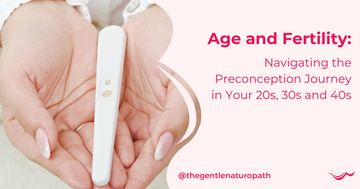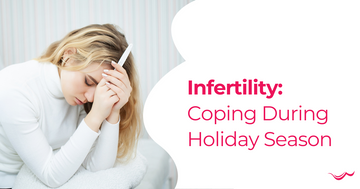Fertility Awareness Method: When am I Most Fertile?
by Nikki Warren on May 02, 2022

The fertility awareness method is so important it should be something we are educated on during our school years. I'm surprised when women with multiple children tell me they had no idea about their cycle or when they were ovulating.
When they wanted to conceive, they stopped using contraception and left it up to luck and fate! They had no idea how lucky they were. Conceiving a baby truly is a miracle.
There are many intricate steps that must take place in a woman’s body and the timing of sex for conception! It is a wonder anyone can conceive easily! Here are a few tips to become more intimate with your cycle:
Get an ovulation app
I remember having a sex education class at school where the teacher gave us a small pocket-sized calendar. She told us to track our cycles every month by circling the days when we had our period. I started that day and have been doing it ever since. However, 2 years ago I discovered the convenience of using an app.
Clue not only tracks when your next period is likely to be, it also calculates your most likely ovulation date. This is an estimation so do not rely on this.
You can also keep a record of your moods throughout your cycle on the app. If you are trying for a baby, you can record your mucus and the days you had sex. You can also record if you had a positive ovulation test. Handy!
Throw away the thermometer
The traditional natural rhythm method suggests using a thermometer to track your temperature throughout your cycle. Your temperature may fall slightly just before you release an egg. Then 24 hours after the egg releases, it rises for a few days.
Apparently, if you are pregnant it continues to rise. Except that I tested that theory and it’s a bit flawed. I took my temperature for a month.
It was tedious having to do it every day. My temperature continued to rise after ovulation. Unless there was some kind of immaculate conception going on, I was definitely NOT pregnant.
I prefer ovulation predictor kits otherwise known as LH surge tests. When you start using them, depends on the length of your cycle. If you have a regular 28-day cycle, you probably ovulate around day 13 to 14. You may start using them on day 11 until you get a positive.
Test in the afternoon at the same time each day. When you get a positive, this means you will ovulate in the next 24-36 hours. If you have a short cycle of 24 days, start testing on day 7 or 8.
After experimenting for a few months, you should have an idea of the best day in your cycle to start testing. This is if you have a regular cycle.
Sticky, wet or dry?
Paying attention to your mucus is one of the best ways of knowing when you’re fertile. For a couple of days after your period, you’re likely to be dry, then the sticky mucus starts.
This is infertile mucus which actually prevents sperm from swimming up the cervical canal. In the days leading up to ovulation, you are likely to become wetter as your mucus becomes more fertile.
Fertile mucus is known as egg white mucus because it looks like, and has the consistency of, raw egg white. This slippery mucus is great lubrication during sex. It helps propel the sperm up the cervix and into the fallopian tubes where it is hoping to meet an egg. After ovulation, you will experience sticky or creamy mucus again until you get your next period.
Ovulation pain
You may notice that at the same time as experiencing egg white mucus, you experience a sharp stabbing pain. In one or both of your ovaries.
Some women can experience quite strong pain which lasts for a few hours or all day. This is ovulation pain, otherwise known as mittelschmerz. The pain may be from the fluid or blood released at ovulation causing irritation of the lining of the pelvic cavity.
Getting to know your cycle
The first day of your cycle is the first day of your period. Not the first day of brown spotting, the first day of red blood.
Ovulation usually occurs 14 days before your next period. So if you have a 24-day cycle, it’s highly likely you ovulate on day 10.
If you have ovulated, your egg follicle will become a corpus luteum and produce progesterone. Progesterone is essential to sustain a pregnancy.
Used all the methods above but are still not sure if you are ovulating? You can have a progesterone test 7 days after your predicted ovulation date to see if you did ovulate. If you have a 28-day cycle, this would be day 21. If progesterone is less than 20, then it’s unlikely you have ovulated.
When to jump in the sack
So now you know when you’re fertile, want to know the best time to seduce your partner? From the time you get that positive OPK test, you should have sex twice a day to really maximise your chances.
If you’re thinking it’s a better idea to save up his sperm for one lusty night, don’t. Sperm that is more than 48 hours old is poor quality. Having regular sex will reduce sperm count.
However, it actually increases the quality of his sperm – motility and morphology. This is what counts when it comes to making healthy babies!
If you're reading this article and thinking "yes, yes, I already know all of this but we're still not conceiving!" Then there may be other factors you need to consider.




